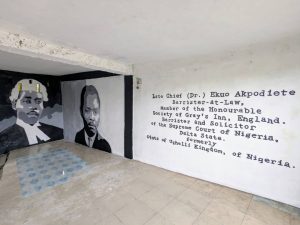Opinion
Exploring AI to bridge digital divide

By Sonny Aragba-Akpore
As humanity grapples with the race to bridge the digital divide, global inequality remains a threat .
For instance an estimated 2.6 billion people around the world remain offline, according to the International Telecommunication Union (ITU), the UN Agency for Digital Technologies.
While overall Internet use is increasing, the benefits of access are unevenly distributed, reinforcing persistent digital divides affecting women and people in countries with lower economic development.
The elderly and people with disabilities are among other groups being left behind.
“Broadband is fundamental to ensure that everyone can benefit from digital technologies when so many people are still offline around the world,” according to ITU Secretary-General Doreen Bogdan-Martin, Co-Vice Chair of ITU Broadband Commission.
“AI and other emerging technologies can help efforts to achieve universal meaningful connectivity, and it’s our job to make sure this happens in a way that is responsible for people and the planet.”
ITU Broadband Commission recently reviewed progress on its 2025 Advocacy Targets, comprising seven objectives for action in broadband development and universal connectivity. One target for mobile broadband affordability is close to being achieved. A target for gender equality in access to broadband has been achieved for some countries, although not globally.
The Commission noted that AI and emerging technologies can drive progress on broadband and the Sustainable Development Goals (SDGs).
But balancing the promotion of AI benefits while managing the challenges is a key task for policy-makers who are “racing to catch up” to the implications of the technologies according to ITU documents.
A worried ITU boss lamented recently about the divide which she and her team think could be addressed before 2030 under the SDGs.
“With one-third of humanity still offline and women and other vulnerable groups on the wrong side of the globe’s digital divides,regulators should raise standards if this one third offline population could be accommodated in the dividends of digital services.”
She spoke at the 2024 Global Regulators Symposium (GSR-2) whose focus was on “Best Practice Guidelines that highlight the innovation, trust, and inclusivity that we need in the policy and regulatory environment,”
She told the regulators that “With change being the only certainty facing regulators and policymakers, we must work together to pursue regulatory approaches to leverage transformative technologies such as AI, promote the space economy, encourage innovation, and support climate action and the UN Sustainable Development Goals.”
The regulators who met in Kampala,Uganda endorsed a set of guidelines to maximize the benefits of transformative information and communication technologies (ICTs) at the Global Symposium for Regulators (GSR-24) which closed July 4 .
GSR 24 highlighted Africa’s National Broadband Mapping Systems project, supported by the European Commission, to help establish broadband mapping systems to foster investment and digital transformation in Africa. With a budget of EUR 15 million over four years, the project will initially benefit 11 countries: Benin, Botswana, Burundi, Côte d’Ivoire, Ethiopia, Kenya, Malawi, Nigeria, Uganda, Zambia and Zimbabwe.
The “GSR-24 Best Practice Guidelines” agreed by ICT regulators include a series of considerations for balancing innovation with regulation to create a positive impact on societies and economies from emerging technologies such as artificial intelligence (AI).
Prior to the opening of GSR-24, the Regional Regulatory Associations (RA) and Digital Regulation Network (DRN) meeting shared experiences and knowledge as well as areas for collaboration. The meeting also featured the achievements of the successful first year of the DRN, focusing on capacity building, thought leadership, and regulatory experimentation and innovation.
Key activities presented include knowledge sharing through the ITU Academy, the broadband mapping project, capacity building activities, contributions to ITU-D Study Groups, RA participation in interactive workshops and engaging on twinning experiences to learn from other Regional Regulatory Associations.
Also ahead of GSR-24, the Industry Advisory Group on Development Issues and Private Sector Chief Regulatory Officers (IAGDI-CRO) convened industry and private sector thought leaders to share experiences and proposals with regulators to address the complex regulatory and business landscape of digital ecosystems.
Apart from digital infrastructure development, implementation of regulatory ”sandboxes,” strategies to enable high-speed connectivity, participants discussed regulation of the future, including new domains such as AI, and technologies for the future.
A session of Network of Women (NoW) in ITU’s Telecommunication Development Sector at GSR-24 explored mechanisms for greater participation of women in ICT-related fields and addressed the leadership gender gap in the ICT sector.
Ms. Jessica Alupo, Vice-President of the Republic of Uganda, opened GSR-24 on July 1, on behalf of Mr. Yoweri Kaguta Museveni, President of the Republic of Uganda.
Hosted by the International Telecommunication Union (ITU), the UN Agency for Digital Technologies – the symposium brought together over 600 participants including Ministers, Heads of Regulatory Authorities, industry executives and academics to discuss pressing regulatory issues.
“We are excited that the GSR provides a platform where all thought leaders, regulators, industry players and other key ICT stakeholders converge to dialogue and set the policy and regulatory agenda that will guide the global digital industry over the near future,” according to Uganda’s Minister for ICT and National Guidance, Dr. Chris Baryomunsi.
“Best practice now calls for a coordinated and collaborative approach that is inclusive of all relevant stakeholders – if we are to achieve the impact that we all desire. We commit to align our national policies and regulatory frameworks around the well-thought-out Best Practice Guidelines that will encourage investment, innovation, and growth in the ICT sector.”
Regulators at GSR-24 noted that equal, global access to existing digital services would help countries leverage transformative technologies.
AI, for example, could help network operators conduct better planning and prevent fraud, but it also raises challenges associated with privacy, bias, job displacement, and the reliability of information.
“At GSR-24, we discussed core policy and regulatory issues to maximise the potential of digital technologies to improve lives. We addressed key topics, including new developments in the field of generative AI and robotics, building an inclusive, safe, and sustainable space economy, and required interventions in addressing climate change challenges,” according to Dr. Cosmas Luckyson Zavazava, Director of ITU’s Telecommunication Development Bureau adding “We brought the global community of regulators together to strengthen our collective capacity to navigate the fast-changing technology landscape and drive sustainable and inclusive digital transformation. We heard from young innovators and entrepreneurs and adopted action-oriented Best Practice Guidelines to help us chart the course of transformative technologies for positive impact.”
“As we navigate the transformative landscape of digital technologies, the importance of impactful regulation cannot be overstated,” according to the Chairman of GSR-24 and Executive Director of the Uganda Communications Commission (UCC), George William Nyombi Thembo. “Our shared learnings and collaborative efforts are crucial in shaping a regulatory environment that not only fosters innovation but also ensures that the benefits of technological advancements are widely shared. By recognizing the interdependencies with other sectors, we can create a cohesive framework that supports sustainable development, economic growth, and inclusivity. Together, we have the power to turn technology into a force for positive change, illuminating pathways to a brighter, more connected future.”
A session of Network of Women (NoW) in ITU’s Telecommunication Development Sector at GSR-24 explored mechanisms for greater participation of women in ICT-related fields and address the leadership gender gap in the ICT sector.
Opinion
5G,IoT and AI to boost global GDP by 2030

By Sonny Aragba-Akpore
With Mobile technologies and services now generating around 5.8% of global Gross Domestic Product (GDP) a contribution that amounts to about $6.5 trillion of economic value, there are strong projections that by 2030, this figure will rise to almost $11 trillion, or 8.4% of GDP.
Global System of Mobile Communications Association (GSMA) says much of this will be driven by countries around the world increasingly benefiting from the improvements in productivity and efficiency brought about by the increased take-up of mobile services and digital technologies, including 5G, Internet of Things (IoT) and Artificial Intelligence (AI).
The GSMA recently introduced the 5G Connectivity Index to provide insights into 5G performance in 39 markets in order to encourage informed decision-making.
In terms of Economic Impact,
the GSMA emphasizes the economic benefits of mobile technologies and services, including 5G, projecting that they will contribute significantly to GDP growth by 2030.
“The GSMA provides specific reports and analyses on 5G in different regions, such as Sub-Saharan Africa, Asia ,Middle East among others highlighting the progress and challenges of 5G deployment in specific areas.”
In Sub Saharan Africa for instance with particular attention on Nigeria,South Africa,Egypt,Kenya and Botswana among others some measure of progress in deployment has been recorded.
The rollout of 5G has brought immense benefits across multiple industry sectors, particularly those involving internet of things (IoT) and artificial intelligence (AI) applications in which the real-time transfer of data is crucial.
More broadly, the adoption of 5G is expected to accompany increased data use across the globe, with forecasts anticipating mobile data traffic of over 300 exabytes per month by 2030, more than twice the volume consumed in 2024 according to Statista.
And with a third of global population expected to be covered by this fifth generation (5G) networks ,a technology that has defined new ways of communication by 2025 ,GSMA
says the technology has surpassed growth projections of all times.
“5G subscriptions increased by 163 million during the third quarter 2024 to total 2.1 billion. 5G subscriptions reached close to 2.3 billion by the end of 2024 accounting for more than 25 percent of all global mobile subscriptions.
“4G subscriptions continue to decline as subscribers migrate to 5G” according to GSMA.
As of the first quarter of 2024, there were nearly two billion 5G connections worldwide, with 185 million new additions. This is expected to grow to 7.7 billion by 2028.”
Statistics show that 5G is the fastest-growing mobile broadband technology, reaching 1.5 billion connections by the end of 2023.
It only took four years to reach this number, compared to 10 years for 3G and more than five years for 4G.
“5G is more than a new generation of technologies; it denotes a new era in which connectivity will become increasingly fluid and flexible.5G Networks will adapt to applications and performance will be tailored precisely to the needs of the user” GSMA submits.
By covering one-third of the world’s population , impact on the mobile industry and its customers will be profound according to GSMA.
To deepen the spread of 5G ,GSMA is working closely with the mobile operators pioneering 5G, “by engaging with governments, vertical industries including automotive, financial services, healthcare providers, transport operators, utilities and other industry sectors to develop business cases for 5G.”
And In order to accelerate the growth and spread, many operators are said to be deploying
AI technology as part of an integral part of telecoms operators’ strategic and operational plans.
“Operators are making important advancements in the deployment of AI technology, which is serving as a transformative force shaping the telecoms industry. By deploying autonomous AI-based systems, operators can enhance operational efficiency, customer satisfaction and security, while also creating new revenue opportunities”.
China, South Korea, the United Kingdom, Germany, and the United States are the leading countries with robust 5G coverage in the world.
Since the first commercial launches of the fifth generation of mobile networks in late 2018, these five countries have emerged as leaders because multiple companies in these countries have deployed networks and are selling compatible devices. Countries including Switzerland and Finland are up and comers in 5G development, though they have limited deployment.
In China there are three Companies leading in deployment.
The world’s largest 5G network was launched by the three largest Chinese network operators Oct 31, 2019, according to the state-run news agency Xinhua. These are China Mobile, China Unicom, and China Telecom which all activated their networks in less than five months after they were issued 5G licenses.
Each of the network operators offered their 5G services at $18 per month in 50 Chinese cities at the beginning of the launch.
GSMA expects 36% of China’s mobile users to be using 5G by 2025. That’s about 600 million subscribers, who would also make up 40% of the entire global 5G market by this year.
This is all despite efforts made by the United States government to hamper the progress of Chinese vendors, though those efforts may affect how Chinese companies may expand into the global market.
In South Korea,SK Telecom and Korea Telecom run as the main competitors for the South Korean 5G market.
SK Telecom acquired spectrum in the 3.5 GHz and 28 GHz frequencies to prepare for deploying 5G.
In April of 2019, the Enterprise claimed to be the first mobile carrier in the world to launch 5G services to work on 5G smartphones. SK Telecom asserted an edge over rival Verizon, as the former launched 5G services available at the same time as Samsung Galaxy S10 5G smartphone launched in South Korea. Verizon launched mobile 5G services in the U.S. before a 5G enabled smartphone was available to U.S. consumers.
SK Telecom also conducted tests with a 5G Standalone (SA) Core (a core not reliant on the 4G network) for their 5G network in cooperation with Samsung Electronics.
The world’s largest 5G network was launched by the three largest Chinese network operators Oct 31, 2019, according to the state-run news agency Xinhua. These are China Mobile, China Unicom, and China Telecom which all activated their networks in less than five months after they were issued 5G licenses. Each of the network operators offered their 5G services at $18 per month in 50 Chinese cities at the beginning of the launch.
“What we are seeing is a concerted effort by the Chinese — the operators, vendors, and government regulators — to deploy 5G as quickly as possible,” Chris Nicoll, principal analyst at ACG Research, pointed this out in a November 1, 2019 SDxCentral article.
With all of these players working together, the three network operators had collectively deployed nearly 86,000 5G base stations peaked over 130,000 by the end of 2019. The latter number breaks down into China Unicom and China telecom, with each planning to install 40,000 base stations, and the market leader China Mobile to install 50,000.This was the projection by 2019 but they have since overshot this by the beginning of 2024.
The International Telecommunication Union (ITU), says 5G coverage reached 40% of the world’s population in 2023 with an uneven coverage and distribution with developed countries having more coverage than low-income countries:
In Europe ,68% of the population is covered and
Americas had 59% of the population covered while
Asia-Pacific has 42% of the population covered as at 2023.
Arab States have 12% of the population covered.
Commonwealth Independent of States (CIS) had 8% of the population covered.
ITU figures show Africa,s coverage rose to 10 % of the population by 2023 .
The ITU also notes that 90% of the world’s population is covered by 4G, but 55% of people without access to 4G live in low-income countries because In low-income countries, 3G is often the only technology available to connect to the Internet.
The ITU develops and adopts international regulations and global standards to enable the harmonization and implementation of broadband mobile networks.
In Africa, around a dozen nations have launched services including Botswana, Kenya, Mauritius, Madagascar, Nigeria, Seychelles, South Africa, Tanzania, Togo, Zimbabwe, and Zambia but Africa is a patchwork of 54 countries.
And penetration is predicted to be slow.
By 2027, Ericsson predicts that 80 percent of phone users in Europe will have 5G service.
At the same time, 5G subscriptions in Africa, home to 1.4 billion people, May stagnate at a little over 10 percent. Why will so few people in Africa get access to 5G services?
China, South Korea, the United Kingdom, Germany, and the United States remain the leading countries with robust 5G coverage in the world.
While many countries are already providing robust services,Africa remains on the outskirts of 5G services.
The countries in Africa that have launched 5G networks, include South Africa with its roll out
In March 2022, when the Independent Communications Authority of South Africa (ICASA) sold spectrum across several bands.
In Nigeria,MTN rolled out commercial 5G services in Lagos in 2022, with other roll out in Abuja, Port Harcourt, Ibadan, Kano, Owerri, and Maiduguri among others.
MTN Congo announced that it was the first country in Central Africa to deploy 5G.
In Botswana Orange deployed 5G technology to provide new services in the Gaborone and Francistown regions.
Other countries in Africa that have launched 5G Fixed Wireless Access (FWA) services include: Angola, Kenya, Zambia, and Zimbabwe.
Analysts say “5G’s potential is growing due to its ability to deliver fiber-like speeds. However, there are still challenges in the region, such as:
Urban areas are reaching their maximum capacity whereas a large portion of the population lives in rural areas.
This explains why 5G adoption in the sub-Saharan region is currently below six percent “
Analysts report that 5G deployment in Africa faces many challenges, including Spectrum assignment,regulatory issues,infrastructure,security,financial resources among others.
“Spectrum is a limited resource that is already in use by other services, such as TV broadcasters and satellite operators. Governments need to open up frequencies and grant 5G licenses at reasonable prices. “
Infrastructure is another major challenge.
“5G networks require a large initial investment, including expensive devices, antennas, and Radio Access Network (RAN) hardware. The infrastructure needs to be fiberized to support 5G services.
Regulatory conditions also serve as challenges to deployment.
For instance “regulatory authorities may not have started the process for licensing and granting frequencies in the right portion “
“Most of the equipment and devices required for 5G deployment need to be imported.”
There are also security challenges that make
5G technology vulnerable to cyber security threats, such as tracking calls and exposing user locations.
Opinion
Right of Reply: THE PUNCH AND BUSYBODY BUSINESS

The recent declaration of a State of Emergency in Rivers State has triggered diverse commentaries from a wide range of Nigerians.
Almost everyone hailed the presidential proclamation because of the visible threat to law and order in the state at the time the action was taken. Of course, there were a few naysayers who read political meanings into an otherwise sincere and prompt intervention.
One such negative interpretation is the position taken by the Editorial Board of The Punch newspaper. In one of its editorials published on the matter, the national daily claimed that the entire crisis was caused by what it described as “the needless meddlesomeness in the governance of the state by its former governor and Tinubu’s Federal Capital Territory Minister, Nyesom Wike….” It is unfortunate that this narrative and others like it have become commonplace in the media space.
How did the Editorial Board of a reputable newspaper arrive at such a conclusion? Their claim that the Sole Administrator, Admiral Ibok Ete Ibas (rtd), has been acting a script purportedly written by the Minister of the Federal Capital Territory, Nyesom Wike, is also faulty and has no iota of truth.
They also faulted the sacking of all political appointees who served in Governor Siminalayi Fubara’s administration, insinuating that their replacements were drawn from Wike’s political camp. Again, nothing can be further from the truth.
Since his appointment as the Sole Administrator of Rivers State, Admiral Ibok Ete Ibas has been running the state with the abundant human resources available in the state and has not imported anybody from outside the state. Did the Editors of The Punch really expect him to run the administration with the politicians loyal to the suspended governor?
Do they not know that the crop of political appointees who served Fubara would have found it difficult to work with the Sole Administrator?
Certainly, they know the truth, but they have chosen to stoke the fire to generate more tensions in Rivers State.
Certain interests might have commissioned this editorial to cast aspersions on the Sole Administrator and raise doubts about his capacity to run the state.
It may also have been the handiwork of Wike’s political detractors, the man whom many politicians love to hate for no other reason than envy and jealousy.
We urge the Punch newspapers to seek a better mode of intervention in the political situation and not dwell on innuendos and unsubstantiated allegations against certain political actors in order to blackmail them.
Dr Ike Odogwu
Opinion
“Chief. Dr. Ekuogbe Akpodiete; A Philanthropist, Lawyer, and Statesman”


In a life of achievement, Chief Ekuogbe Akpodiete popularly called the Duke by his contemporaries in the UK was an assessment clerk, post office clerk, a court interpreter, an educationist, a business man, a political party chieftain, a Barrister and Solicitor, a Magistrate, the Otota (the Prime Minister) of Ughelli kingdom which is the highest traditional chieftaincy office that underpin the royal office of the Ovie of Ughelli Kingdom.
He was a trail blazer, a strict disciplinarian, a lover of people, and a philantropist. He saw to it that people lived in peace and happiness.
Born on the 4th of April, 1924, to parents cut from an industrious mould, Chief Ekuogbe Rowland Gregory Akpodiete took zealously to education that neither his mother Ughweriaka who was a trader, nor his father Akpodiete who was a farmer had.
He attended the Native Authority Primary School, Ughelli, and Enitona High School, Port Harcourt, for his secondary school education.
He thereafter had a brief teaching career in primary schools in Ofuoma near Ughelli, he worked as a process clerk in the then Sapele Township Department between 1950 and 1953, serving at the same time as an interpreter in the local courts.
He proceeded to the United Kingdom to seek the proverbial Golden Fleece where he worked and paid his way through, studying Law. He was admitted into the Honourable society of Gray’s Inn, England, in 1965, and shortly after, he returned home to Nigeria and attended the Nigerian Law School. He was called to the Nigerian Bar in 1966. He immediately started practice in Lagos. However, his practice in Lagos was regrettably abridged by the Nigerian Civil War, which drove him to his hometown Ughelli in 1967, where he continued to practise among his kith and kin as the first Legal Practitioner.
Chief Ekuogbe Akpodiete established himself in Ughelli. After the civil war, he served in the now defunct Mid-western State Judiciary from 1972 to 1975 as a Magistrate.
He was conferred with the chieftaincy title of Urhukperovie of Ughelli kingdom (the light of the King) by the then reigning Ovie of Ughelli, His Royal Highness Oharisi II of blessed memory in 1977.
In the quest for more knowledge, he went back to England for his Master’s degree in law (LL.M) and later a Ph.D. at the University of Warwick.
He was awarded an honourary doctorate degree (Ph.D) by Tenesse Christian University from the United States of America in 1991.
He became the Otota (the Prime Minister) of Ughelli Kingdom in 1986, an office he occupied until his demise on 9th April 1995.
Chief Ekuogbe Akpodiete was also politically involved. In the heady days of the Awolowo-led Unity Party of Nigeria, he was the party’s legal adviser in Ughelli and was on hand to assist during Chief Obafemi Awolowo’s campaign hosting in Ughelli and its environs.
In view of his love for people and entertainment, he established a popular cinema house, one of the first in Ughelli, known as REGA cinema, coined from his names, alongside an entertainment place called Unutakunu (people talk to people).
Chief Ekuogbe Akpodiete was blessed with wives and many children, grandchildren, and great grand children.
Mr. Olotu Akpodiete, PhD
Executive Director
Olotu & Ekuogbe Rowland Akpodiete foundation
-

 News24 hours ago
News24 hours agoEmergency Rule: Punch Editorial went overboard – CRP
-

 News12 hours ago
News12 hours agoPDP governors declare support for Tinubu
-

 News15 hours ago
News15 hours agoEx-finance minister rearrested in new fraud probe
-

 News13 hours ago
News13 hours agoHope for Nigerians as Dangote refinery slashes petrol price again
-

 News23 hours ago
News23 hours agoJust in: Rivers Administrator summons, suspended Gov, deputy
-

 News23 hours ago
News23 hours agoCBEX Staff Arrested After Trading Platform Collapse
-

 News15 hours ago
News15 hours agoFubara: How can I forgive somebody who never requested for it– Wike
-

 News16 hours ago
News16 hours agoAlleged Se3ual Harassment: Natasha Declines Out-Of-Court Settlement Proposal By Akpabio’s Counsel






